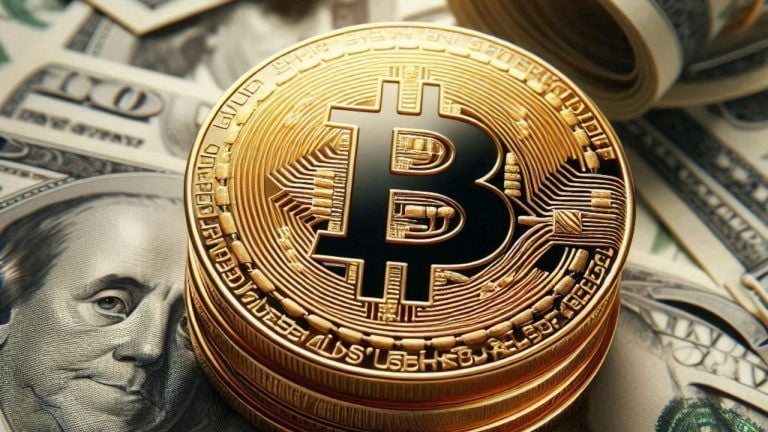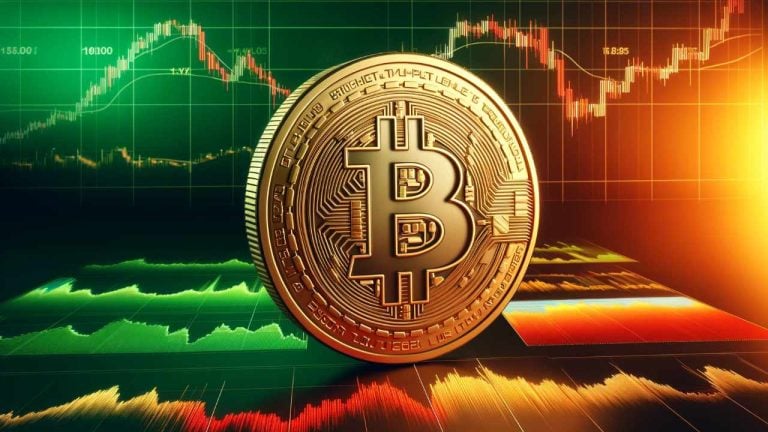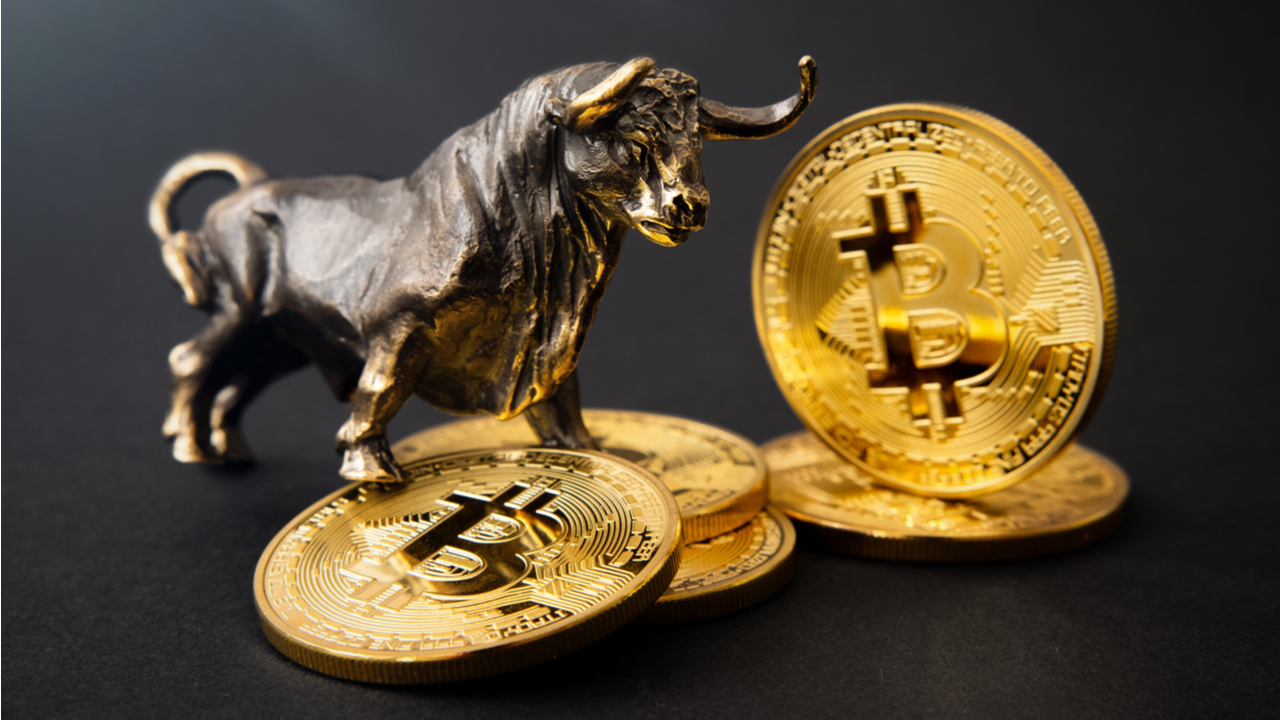
Hoth Therapeutics allocates $1 million to Bitcoin, reflecting rising business adoption amid increasing attention on BTC’s inflation-resistant value.
Hoth Therapeutics, a clinical-stage biopharmaceutical company, has allocated up to $1 million to Bitcoin, aiming to leverage the cryptocurrency’s potential as a store of value and hedge against inflation.
The company’s board of directors approved the move, reflecting a growing trend among businesses in the United States amid renewed interest in Bitcoin (BTC) following Donald Trump’s reelection as president.
This trend aligns with recent comments from US Senator Cynthia Lummis, who has urged the US Treasury Department to consider converting some of its gold reserves into Bitcoin.
 Precious metals prices are on the move again, with gold hitting a new peak of $2,564 during Tuesday’s trading sessions. As of now, gold is being traded at $2,527 per ounce, while silver has climbed more than 6% this week, currently standing at $29.68 per ounce. Market trends show that the prices of precious metals […]
Precious metals prices are on the move again, with gold hitting a new peak of $2,564 during Tuesday’s trading sessions. As of now, gold is being traded at $2,527 per ounce, while silver has climbed more than 6% this week, currently standing at $29.68 per ounce. Market trends show that the prices of precious metals […] Ricardo Salinas, the third wealthiest man in Mexico, has recently doubled down on his proposal to use Bitcoin as a reserve asset. On social media, Salinas defended the role of Bitcoin as an inflation hedge, commenting on a post that presented inflation as a hidden tax on fiat money and advised his followers to purchase […]
Ricardo Salinas, the third wealthiest man in Mexico, has recently doubled down on his proposal to use Bitcoin as a reserve asset. On social media, Salinas defended the role of Bitcoin as an inflation hedge, commenting on a post that presented inflation as a hidden tax on fiat money and advised his followers to purchase […] Skybridge Capital founder Anthony Scaramucci firmly believes that bitcoin will be both an inflation hedge and a store of value as the cryptocurrency scales. He emphasized that bitcoin is “still an early stage technical asset that will trade like other risk assets until it exceeds a billion users.” Scaramucci Doubles Down on Bitcoin as Inflation […]
Skybridge Capital founder Anthony Scaramucci firmly believes that bitcoin will be both an inflation hedge and a store of value as the cryptocurrency scales. He emphasized that bitcoin is “still an early stage technical asset that will trade like other risk assets until it exceeds a billion users.” Scaramucci Doubles Down on Bitcoin as Inflation […]
The new all-time highs come despite Bitcoin still being down over 50% against its price peak of $69,000 against the U.S. dollar.
The price of Bitcoin (BTC) has notched new all-time highs against some of the world’s most inflationary fiat currencies.
Across 30 hours over Oct. 23 to 24, the cost of buying one Bitcoin has reached all time-highs when using the Argentine peso (ARS), Nigerian naira (NGN), Turkish lira (TRY), Laotian kip (LAK) and the Egyptian pound (EGT).
#Bitcoin just hit an all-time high in Argentina, Turkey and Nigeria. pic.twitter.com/sKRNUaBMX8
— Miles Deutscher (@milesdeutscher) October 26, 2023
However, it should be noted that the result is due to the ongoing devaluation of the currencies, exacerbated by Bitcoin’s recent 16% price increase.
NGN and TRY fell to their lowest points against the U.S. dollar on Oct. 24 and Oct.25, while ARS is only 0.85% off its all-time low (against the U.S. dollar).
According to the International Monetary Fund, the Venezuelan bolivar currently has the highest annual inflation rate at 360%, followed by Zimbabwean dollar (314%), Sudanese pound (256%) and ARS (122%).
The Turkish lira and Nigerian naira came in sixth and 15th with annual inflation rates of 51% and 25% respectively, IMF’s data shows.

Crypto observers have long seen digital assets, such as Bitcoin and stablecoins, as a hedge against rocketing inflation, the recent figures could bolster that narrative.
Nigeria, Turkey and Argentina boast the 2nd, 12th and 15th highest rates of cryptocurrency adoption in the world, according to a Sept. 12 report by Chainalysis.
With inflation at 99% in #Argentina, it’s 99% likely that the citizens of that beautiful country would benefit from #Bitcoin.
— Michael Saylor⚡️ (@saylor) February 15, 2023
However, the governments of these countries haven't always seen eye-to-eye with the cryptocurrency industry.
Nigeria is finally becoming more welcoming to cryptocurrencies after its central bank banned local banks from providing services to cryptocurrency exchanges in Feb. 2021.
Progress was made in December 2022 when Nigeria announced its intention to pass a bill recognizing cryptocurrencies as “capital for investment” — citing the need to keep up with “global practices” as one of the main reasons behind its change in stance.
And while Turkey is home to some of the most crypto-curious people, its central bank banned cryptocurrency payments for goods and services in April 2021. It has also working on a central bank digital currency (CBDC) to digitalize the Turkish lira over the last few years.
#Bitcoin fixes this
— Gülben Gözü (@gulbengozu) August 28, 2023
I'm back in my beautiful country, Turkey, after 6 months. Shocked to witness the same goods costing 3–4 times more already. Rents, food, public transport, and more costs skyrocket regularly. High inflation's devastation is real and alarming. pic.twitter.com/X4N4Axuh1n
Meanwhile, Argentina’s inflation crisis could be influenced by the outcome of its presidential election in November, with presidential candidate Javier Milei set to face competitor Sergi Massa in a final run-off vote on Nov. 19.
Related: Turkey to use blockchain-based digital identity for online public services
Massa, who currently serves as the country’s minister of economy, wants Argentina to launch a central bank digital currency (CBDC) “as soon as possible” as a means to “solve” the country’s long-lasting inflation crisis.
Argentina's present provides a glimpse into America's future, where the central bank raised interest rates 15 percentage points to 133% on Oct. 12. But with #inflation running at 138% and budget deficits and debt rising, the rate hikes will have no effect on reducing inflation.
— Peter Schiff (@PeterSchiff) October 26, 2023
He has also voiced an intention to keep the U.S. dollar away from Argentinians, explaining that Argentinians should instead be “patriots” and defend the Argentine Peso.
Milei on the other hand, wants the U.S dollar to be adopted in addition to abolishing Argentina’s central bank.
Magazine: Unstablecoins: Depegging, bank runs and other risks loom

The hedge fund manager instead wants to see an “inflation-linked coin” be brought to the masses which would serve to ensure consumers secure their buying power.
Billionaire investor Ray Dalio has described fiat currency as being in serious “jeopardy” as an effective store of wealth but doesn’t believe Bitcoin (BTC) and stablecoins will be the solution either.
Dalio, the founder of hedge fund firm Bridgewater Associates explained on CNBC Squawk Box on Feb. 2 that the mass money printing of the United States Dollar and other reserve currencies has him questioning whether they are forms of “effective money.”
“We are in a world in which money as we know it is in jeopardy. We are printing too much, and it's not just the United States, it is all the reserve currencies.”
However, Dalio was quick to add his thoughts on whether Bitcoin was a potential solution, acknowledging that despite what it has accomplished in “12 years,” it is still too volatile to serve as money:
"It's not going to be an effective money. It's not an effective store holder of wealth. It's not an effective medium of exchange," he argued.
He also dismissed stablecoins as an effective form of money as it is a replica of state-backed fiat currency.
Instead, Dalio proposed the creation of an “inflation-linked coin” that would serve to ensure consumers secure their buying power.
“The closest thing to that is an inflation index bond, but if you created a coin that says OK this is buying power that I know I can save in and put my money in over a period of time and transact in anywhere, I think that would be a good coin,” he said.
"#Bitcoin has no relation to anything. It's a tiny thing that gets disproportionate attention," says @RayDalio on #crypto. "The value of $BTC is less than 1/3 of $MSFT stock. It's not an effective store of wealth. But we are in a world where money as we know it is in jeopardy." pic.twitter.com/Cc7o2TwkxG
— Squawk Box (@SquawkCNBC) February 2, 2023
"So I think you're going to see the development of coins that you haven't seen that probably will end up being attractive, viable coins. I don't think Bitcoin is it," he added.
However, not everyone agreed with Dalio’s take on Bitcoin and the viability of an inflation-linked coin.
Digital asset manager Eric Weiss of Bitcoin for Family Officers was one, who told his 38,300 Twitter followers that such a coin could not exist:
"According to Ray, [Bitcoin] is very close to being the solution to the world's problems but its too volatile. He's waiting for and vaguely describes a solution that doesn't and can't exist," said Weiss.
ARK Invest CEO Cathie Wood also had a different view of Bitcoin, referring to it as a defense against wealth confiscation in parts of the developing world:
“I’m struck that the market is now leading the Fed,” @ARKinvest Founder @CathieDWood says on bond market downtrends.https://t.co/DDNw4dbOPD pic.twitter.com/AAS0UWf0kh
— Yahoo Finance (@YahooFinance) February 2, 2023
“Those populations need a fallback, an insurance policy like Bitcoin,” she said.
Related: Crypto-friendly Ray Dalio steps back from Bridgewater’s $150M fund
Dalio’s latest views on Bitcoin come despite recently labeling it “one hell of an invention” that could serve as a viable inflation hedge. However, these remarks were made on Jan. 28, 2021 — before the current bear market took effect.
The billionaire investor has also previously recommended BTC should make up 1-2% of an investors portfolio on Jan. 6, 2022.
As an investment product, the hedge fund manager said in May. 24, 2021 that he would rather buy BTC over bonds but later stated on Aug. 5, 2021, that he still prefers gold.
On Oct. 4, Dalio stepped down as a co-chief investment officer, but remained on board as a mentor.

The Skybridge Capital CEO said Bitcoin needs much more proliferation before it can act as an inflation hedge.
Skybridge Capital CEO Anthony Scaramucci believes that while Bitcoin continues to be an attractive asset, it has not reached the “wallet bandwidth” that is required for it to be considered an inflation hedge.
Speaking on CNBC’s Squawk Box on Aug 22. the global investment management CEO said Bitcoin was still too much of “an early adopting technical asset” which would need to be held in around a billion wallets before it would begin to act as a hedge against inflation.
“Until you get into the billion, billion-plus zone, I don’t think you’re going to see Bitcoin as an inflation [hedge] as it’s still an early adopting technical asset.”
While the exact number of Bitcoin wallets in the world is unknown, estimates place this number at approximately 200 million.
In its earlier years, some touted Bitcoin as a potential hedge against inflation, given its fixed supply of 21 million coins. This narrative has changed over time, however, as Bitcoin has been observed as being increasingly correlated to the stock market, according to a new IMF report.
"#Bitcoin is still not a mature enough asset to be regarded as a potential inflation hedge," says @scaramucci on $BTC. "You just don't have the wallet bandwidth with Bitcoin. It's still an early adopting technical asset." pic.twitter.com/YTsy6W3HGU
— Squawk Box (@SquawkCNBC) August 22, 2022
Scaramucci said he was still bullish on Bitcoin and the overall crypto market pointing to recent moves from BlackRock to launch a new private spot Bitcoin trust with Coinbase as the custodian — a sign that there is strong institutionalized demand for the leading cryptocurrency.
Scaramucci believes that the markets are currently filled with a ton of short positions, which could result in people getting “their faces ripped off when they least expect it.
In a recent interview with Cointelegraph, Steven Lubka, managing director of private clients at Swan Bitcoin argued that Bitcoin should still be considered an inflation hedge.
While Lubka agreed that Bitcoin has failed to act as an inflationary hedge during the global inflation events this year, he believes that this inflation has been predominantly caused by supply shocks rather than monetary expansion — where Bitcoin is able to hedge against inflation more effectively.
Related: UK hits double-digit inflation for the first time in 40 years
As of the time of writing, Bitcoin’s price is currently $21,406, down 69.01% from its all-time high of $69,045 on November 11 last year.
Also speaking on ‘Squawk Box’ on Monday, Coinshare’s chief strategy officer Meltem Demirors said she expects Bitcoin prices will continue to remain flat throughout the third quarter as the price correlation between tech equities and cryptocurrencies continues.
"With #Bitcoin we've seen a lot of buying on dips," says @Melt_Dem. "While internally there's a lot of enthusiasm within the #crypto community around the merge... I don't think there's a lot of new capital coming in to buy #Etherium on these changed fundamentals." pic.twitter.com/8KBiRHfT1f
— Squawk Box (@SquawkCNBC) August 22, 2022
 The latest data debrief issued by Kaiko, a provider of digital assets market data, has found that while there is retail movement in Latam regarding crypto assets, most liquidity is directed to “real world” use cases. Among these activities are remittances, stablecoin-based yield generating investment options, and also payments, with Bitso and Mercado Bitcoin being […]
The latest data debrief issued by Kaiko, a provider of digital assets market data, has found that while there is retail movement in Latam regarding crypto assets, most liquidity is directed to “real world” use cases. Among these activities are remittances, stablecoin-based yield generating investment options, and also payments, with Bitso and Mercado Bitcoin being […] Tim Draper, an early bitcoin investor, has declared he is still optimistic about the value of the first cryptocurrency even with the downturn its price has taken in the last months. Draper believes that the asset is still valuable as an inflation hedge, and that the market we are navigating right now is “very similar” […]
Tim Draper, an early bitcoin investor, has declared he is still optimistic about the value of the first cryptocurrency even with the downturn its price has taken in the last months. Draper believes that the asset is still valuable as an inflation hedge, and that the market we are navigating right now is “very similar” […] The CEO of a Canada-headquartered gold mining company, Mark Bristow, has insisted that gold currently has little downside risk. He also highlighted the precious nature of the metal and how it is a better alternative store of value than cryptocurrencies. Better Inflation Hedge Mark Bristow, the CEO of Canada-based Barrick Gold Corp., recently argued that […]
The CEO of a Canada-headquartered gold mining company, Mark Bristow, has insisted that gold currently has little downside risk. He also highlighted the precious nature of the metal and how it is a better alternative store of value than cryptocurrencies. Better Inflation Hedge Mark Bristow, the CEO of Canada-based Barrick Gold Corp., recently argued that […]